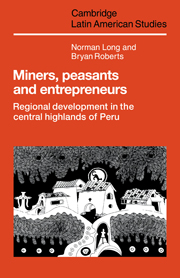Book contents
- Frontmatter
- Contents
- List of tables
- List of figures
- List of maps
- Preface
- 1 Regional development in an export economy
- 2 The development of a regional economy in the central highlands
- 3 The Mining Corporation and regional development
- 4 Class relations, local economies and large-scale mining
- 5 Highland puna communities and the impact of the mining economy
- 6 Migration and social differentiation amongst Mantaro valley peasants
- 7 Industrialization and the emergence of an informal regional economy
- 8 The village economy, agricultural development and contemporary patterns of social differentiation
- 9 Regional commitment among central highlands migrants in Lima
- 10 Confederations of households: extended domestic enterprises in city and country
- 11 Regional development in peripheral economies
- Notes
- Bibliography
- Index
- Titles in the series
10 - Confederations of households: extended domestic enterprises in city and country
Published online by Cambridge University Press: 07 May 2010
- Frontmatter
- Contents
- List of tables
- List of figures
- List of maps
- Preface
- 1 Regional development in an export economy
- 2 The development of a regional economy in the central highlands
- 3 The Mining Corporation and regional development
- 4 Class relations, local economies and large-scale mining
- 5 Highland puna communities and the impact of the mining economy
- 6 Migration and social differentiation amongst Mantaro valley peasants
- 7 Industrialization and the emergence of an informal regional economy
- 8 The village economy, agricultural development and contemporary patterns of social differentiation
- 9 Regional commitment among central highlands migrants in Lima
- 10 Confederations of households: extended domestic enterprises in city and country
- 11 Regional development in peripheral economies
- Notes
- Bibliography
- Index
- Titles in the series
Summary
This chapter focusses on the specific forms of what McGee (1979) has called ‘making out’, which evolved among a group of Peruvian people whose livelihoods were both rural and urban and both agricultural and nonagricultural. The evidence suggests that the uneven and volatile nature of the capitalist economy led, in this case, to a complex series of linkages between households across space (not merely between the city and the country, but also within the city itself). This spread of livelihood pursuits across space was a reflection of the households' involvement in a variety of economic activities within the context of a very uncertain economic environment.
This dispersed nature of livelihood pursuits affected the character of fieldwork design in two ways. Firstly, working from one or other end of the rural-urban migration process, or on one area within the city, would make it difficult to examine the precise effects of the livelihood pursuits of a household in one location on the livelihood pursuits of households linked to it, but in another location. In this particular case, fieldwork was undertaken first in a specific rural area and then linkages were followed through to various locations until, eventually, the project itself was moved to the Lima barriadas and slums, while continuing to focus on people coming from our original community rather than on any one location in the city (cf. Mitchell, 1966; Philpott, 1973).
Secondly, the dispersion of livelihood pursuits, combined with the flexible nature of household composition as people move in pursuit of their various interests, can make the use of statistical data gathered at any one moment extremely distorting.
- Type
- Chapter
- Information
- Miners, Peasants and EntrepreneursRegional Development in the Central Highlands of Peru, pp. 217 - 234Publisher: Cambridge University PressPrint publication year: 1984
- 8
- Cited by



